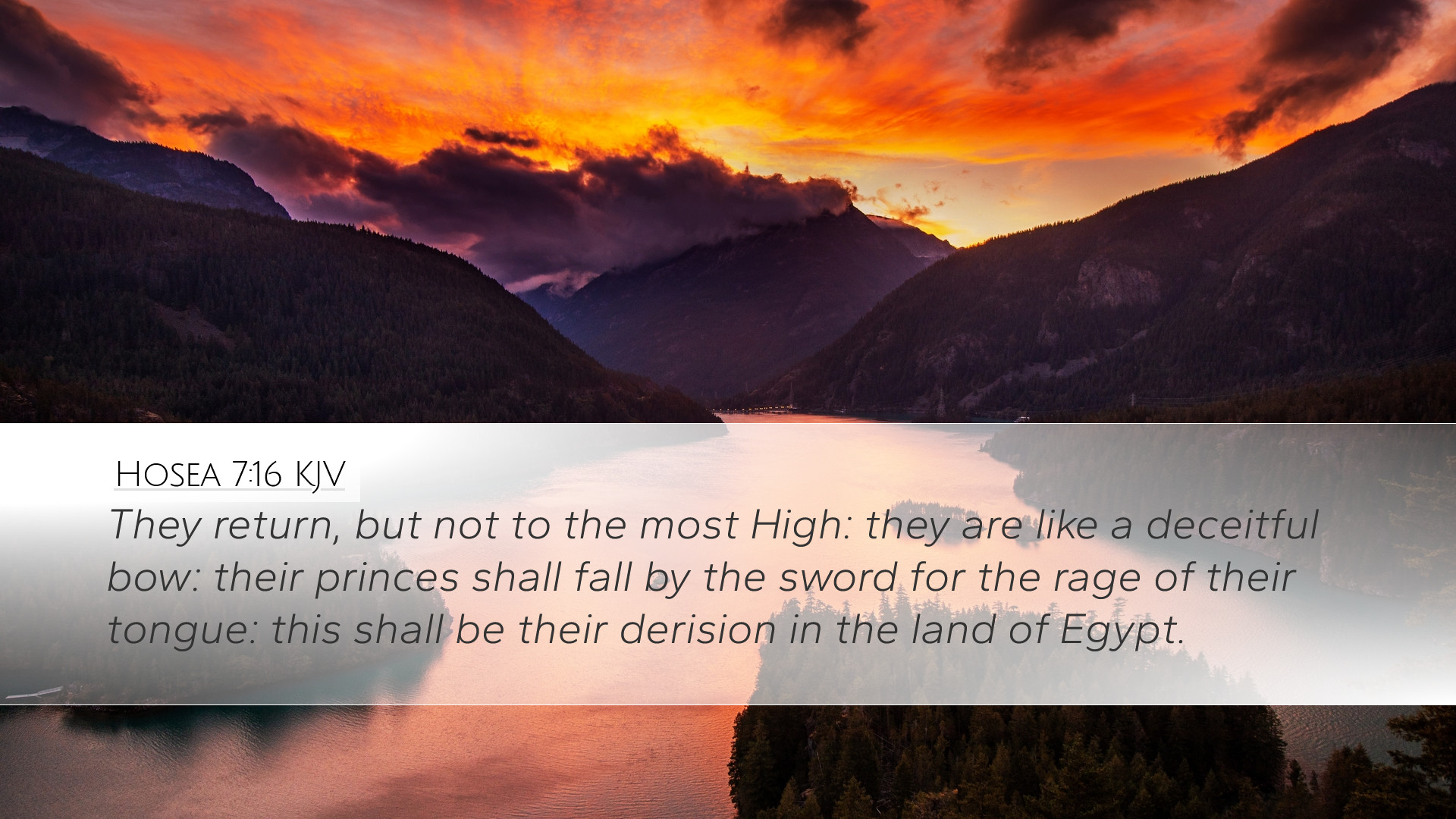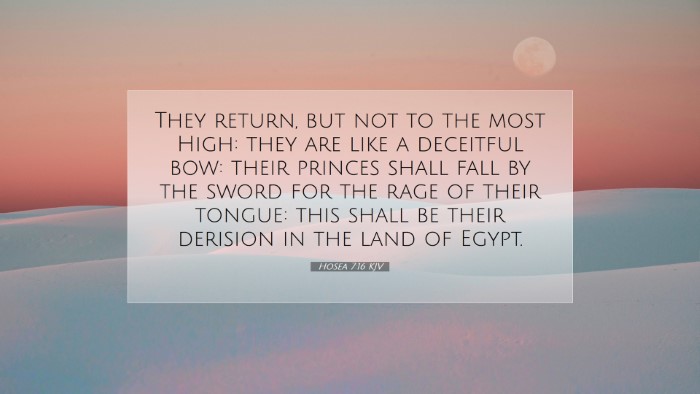Old Testament
Genesis Exodus Leviticus Numbers Deuteronomy Joshua Judges Ruth 1 Samuel 2 Samuel 1 Kings 2 Kings 1 Chronicles 2 Chronicles Ezra Nehemiah Esther Job Psalms Proverbs Ecclesiastes Song of Solomon Isaiah Jeremiah Lamentations Ezekiel Daniel Hosea Joel Amos Obadiah Jonah Micah Nahum Habakkuk Zephaniah Haggai Zechariah MalachiHosea 7:16
Hosea 7:16 KJV
They return, but not to the most High: they are like a deceitful bow: their princes shall fall by the sword for the rage of their tongue: this shall be their derision in the land of Egypt.
Hosea 7:16 Bible Commentary
Commentary on Hosea 7:16
Verse Reference: Hosea 7:16 - "They return, but not to the Most High: they are like a deceitful bow: their princes shall fall by the sword for the rage of their tongue: this shall be their derision in the land of Egypt."
Introduction
The book of Hosea presents a profound portrayal of the tumultuous relationship between God and Israel, often marked by Israel's unfaithfulness and God's steadfast love. In Hosea 7:16, the prophet encapsulates critical attributes of Israel's behavior and its consequences. This commentary brings together insights from notable commentators to guide pastors, students, theologians, and Bible scholars through this complex verse.
Contextual Background
The context of Hosea is crucial for understanding its message. The Northern Kingdom of Israel was characterized by idolatry, immorality, and an overall rejection of Yahweh. Hosea used vivid imagery and poignant language to convey God's deep sorrow over Israel's actions.
Historical Context
During Hosea's prophetic ministry, Israel faced political instability, social injustice, and military threats. The nation turned from God, seeking alliances with foreign powers instead of trusting in His protection. Hosea's call to repentance was rooted in a desire for Israel to return to their covenant with God.
Verse Analysis
They Return, but Not to the Most High
Commentators like Matthew Henry note that this phrase indicates a false repentance. The Israelites exhibited outward signs of returning but lacked true heart transformation. Their return is superficial and devoid of genuine recognition of their need for God.
Deceitful Bow
Henry further elaborates that equating Israel to a “deceitful bow” signifies instability and unreliability. Just as a deceitful bow fails to shoot straight, Israel’s attempts to return to God would not produce the intended spiritual outcomes. Albert Barnes adds that the bow, meant for warfare, represents Israel’s failure to defend themselves against their enemies. This symbolizes their ineffectiveness in spiritual matters.
Princes Shall Fall by the Sword
This prophetic warning indicates that Israel's leaders would face dire consequences due to their betrayal of God's covenant. Adam Clarke points out that the pride and arrogance of these leaders would lead to their downfall. The phrase underscores God's justice; leadership comes with responsibility, and failure will lead to inevitable judgment.
For the Rage of Their Tongue
The "rage of their tongue" suggests that the words of Israel’s leaders were not only harmful but also destructive. Clarke emphasizes that destructive speech can lead to conflict and disunity. The people of Israel were led astray by vain promises and misleading rhetoric, resulting in God's judgment upon them.
Derision in the Land of Egypt
The concluding statement that this shall be their derision in the land of Egypt reinforces the idea of humiliation resulting from their actions. Barnes interprets this as a warning that the consequences of their deception would be publicly seen and mocked by their enemies, particularly Egypt, a nation symbolic of oppression and captivity.
Theological Implications
The theological significance of Hosea 7:16 extends beyond its historical context. It invites reflection on repentance, the nature of God's justice, and the effects of leadership.
True Repentance
The notion of returning to God does not simply imply a change of physical direction but a heartfelt transformation. True repentance involves a recognition of sin and a genuine turning towards God. Henry stresses the necessity for authenticity in one’s faith journey, indicating that God desires truthfulness over hollow gestures.
The Nature of Human Leadership
Leaders are called to shepherd their people with integrity and truth. The failures of Israel's leaders serve as a cautionary tale for contemporary believers about the importance of leading with godly principles. Clarke illustrates that leadership comes with accountability to God, emphasizing that leaders must model sincere repentance and righteousness.
Consequences of Sin
The judgment articulated in this verse illustrates the seriousness of sin and the resulting fallout. The lack of genuine repentance can lead to devastating outcomes, not only in individual lives but also in the community as a whole. The public shame faced by Israel serves as a grim reminder of the visible consequences of disobedience to God.
Conclusion
Hosea 7:16 offers rich insights into the character of God and invites reflection on the nature of repentance and leadership. As pastors, students, theologians, and scholars engage with this passage, they are encouraged to examine their own hearts and communities in light of the truths conveyed in Hosea’s prophecy. The call to sincerity, accountability, and genuine faith resonates throughout the text, challenging readers to avoid the pitfalls of superficial religion and embrace a transformative relationship with the Most High.


